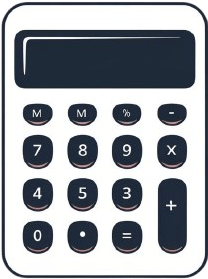Calorie Calculator
Did you know that 45% of Americans actively try to maintain their weight through diet and exercise? An online calorie calculator can be your secret weapon in this journey! Whether you’re looking to shed a few pounds, bulk up, or simply maintain a healthy lifestyle, understanding your daily caloric needs is crucial. In this guide, we’ll explore the ins and outs of online calorie calculators, helping you find the perfect tool to supercharge your health and fitness goals. Let’s dive in and crunch those numbers!
What Is an Online Calorie Calculator?
In the digital age, where technology intersects with health and fitness, online calorie calculators have emerged as indispensable tools for anyone looking to take control of their nutritional intake. But what exactly are these digital marvels, and how do they differ from traditional methods of calorie counting?
At its core, an online calorie calculator is a web-based tool designed to estimate your daily caloric needs based on various personal factors. These calculators take the guesswork out of nutrition planning, providing you with a tailored estimate of how many calories you should consume to achieve your specific health and fitness goals.
Unlike traditional methods, which often involved manual calculations and flipping through dense nutritional guides, online calorie calculators offer instant results with just a few clicks. They’ve revolutionized the way we approach diet planning, making it accessible to everyone – from fitness newbies to seasoned athletes.
The benefits of using these digital tools are numerous:
- Accuracy: By considering multiple factors like age, gender, height, weight, and activity level, online calculators provide more precise estimates than one-size-fits-all approaches.
- Convenience: No need for complex math or bulky reference books – everything you need is at your fingertips, accessible from any device with internet connectivity.
- Customization: Many calculators allow you to input specific goals, dietary preferences, and health conditions, tailoring the results to your unique situation.
- Real-time adjustments: As your weight or activity level changes, you can easily update your information and get new calorie recommendations on the fly.
- Education: These tools often come with additional resources and information, helping you learn about nutrition as you track your calories.
By leveraging the power of algorithms and nutritional science, online calorie calculators have become an essential component of modern health and fitness routines. They empower users to make informed decisions about their diet, paving the way for more effective and sustainable lifestyle changes.
How Online Calorie Calculators Work
Ever wondered about the magic behind these digital nutritionists? Let’s pull back the curtain and explore the inner workings of online calorie calculators. Trust me, it’s not as complicated as you might think!
The Input Factors
When you fire up an online calorie calculator, you’ll typically be asked to provide some key information about yourself. These input factors are crucial for generating an accurate estimate of your caloric needs. Here’s what you’ll usually need to enter:
- Age: Your metabolic rate changes as you age, affecting your calorie requirements.
- Gender: Men and women generally have different calorie needs due to variations in body composition.
- Height and Weight: These factors help determine your body size and composition.
- Activity Level: From couch potato to marathon runner, your daily energy expenditure varies greatly based on how active you are.
Some more advanced calculators might also ask for:
- Body fat percentage
- Specific fitness goals (weight loss, muscle gain, maintenance)
- Dietary preferences or restrictions
The Calculation Methods
Once you’ve input your data, the calculator gets to work, employing one of several scientifically validated equations to estimate your calorie needs. The two most commonly used methods are:
- Harris-Benedict Equation: This classic formula, developed in the early 20th century, calculates your Basal Metabolic Rate (BMR) – the number of calories you burn at rest. It then factors in your activity level to determine your total daily energy expenditure.
- Mifflin-St Jeor Equation: A more recent and generally more accurate formula, especially for individuals in the normal to obese BMI ranges. It also calculates BMR but uses slightly different coefficients.
Here’s a simplified version of how these calculations work:
- Calculate BMR using height, weight, age, and gender.
- Multiply BMR by an activity factor to get total daily energy expenditure.
- Adjust the result based on your goals (e.g., subtract calories for weight loss, add for weight gain).
Accuracy and Limitations
While online calorie calculators are incredibly useful, it’s important to understand their limitations:
- Estimates, Not Exactitudes: These calculators provide estimates based on average data. Your individual metabolism may vary.
- Activity Level Subjectivity: The definition of “moderate” or “very active” can differ from person to person, potentially skewing results.
- Muscle Mass Considerations: Most calculators don’t account for muscle mass, which burns more calories than fat tissue.
- Health Conditions: Certain medical conditions or medications can affect metabolism in ways that aren’t factored into standard calculations.
Top Features to Look for in an
Macro and Micronutrient Tracking Capabilities
Calories aren’t everything! A top-notch calculator should also help you keep tabs on:
- Macronutrients (proteins, fats, carbs)
- Essential vitamins and minerals
- Fiber intake
This comprehensive approach ensures you’re not just hitting calorie targets, but also nourishing your body with balanced nutrition.
Food Database and Barcode Scanning Functionality
Make your life easier with these time-saving features:
- Extensive database of common foods and restaurant meals
- Barcode scanning for quick logging of packaged foods
- Ability to save custom meals and recipes
The more streamlined the logging process, the more likely you are to maintain consistent tracking.
Best Online Calorie Calculators of
How to Use an Online Calorie Calculator Effectively
You’ve chosen your calculator, now what? Let’s dive into how to make the most of this powerful tool:
Setting Realistic Goals Based on Calculator Results
Your calculator will give you a baseline calorie target, but it’s up to you to set achievable goals:
- Start with small, sustainable changes
- Aim for a moderate calorie deficit/surplus (usually 300-500 calories per day)
- Consider non-scale victories too, like increased energy or better sleep
Remember, slow and steady wins the race when it comes to lasting health changes!
Adjusting Intake for Weight Loss, Gain, or Maintenance
Your calorie needs will change as you progress:
- For weight loss: Gradually decrease calories, but never go below 1200 for women or 1500 for men without medical supervision
- For weight gain: Slowly increase calories, focusing on nutrient-dense foods
- For maintenance: Fine-tune your intake based on weekly averages, not daily fluctuations
Tracking Progress and Making Necessary Adjustments
Consistency is key:
- Log your food intake daily
- Weigh yourself regularly (but not obsessively)
- Take body measurements and progress photos
- Adjust your calorie goals every 2-4 weeks based on your progress
Combining Calorie Counting with Balanced Nutrition
Calories matter, but so does the quality of those calories:
- Aim for a balanced mix of proteins, carbs, and healthy fats
- Include plenty of fruits, vegetables, and whole grains
- Don’t sacrifice nutritional value for low-calorie options
- Stay hydrated – sometimes thirst masquerades as hunger!
Common Mistakes to Avoid When Using Calorie Calculators
Even the best tools can be misused. Steer clear of these common pitfalls:
Underestimating Portion Sizes
Our eyes can deceive us when it comes to portions:
- Use measuring cups and food scales for accuracy
- Learn to eyeball portions using everyday objects (e.g., a deck of cards for 3 oz of meat)
- Be especially careful with calorie-dense foods like nuts and oils
Forgetting to Log Snacks and Drinks
Those little bites add up:
- Log everything, even small tastes while cooking
- Don’t forget liquid calories from sodas, juices, and alcoholic beverages
- Be mindful of “mindless” snacking while watching TV or working
Ignoring Nutritional Quality of Foods
Not all calories are created equal:
- 200 calories of broccoli affects your body differently than 200 calories of candy
- Focus on nutrient-dense whole foods
- Don’t fall into the trap of eating processed “diet” foods just because they’re low in calories
Becoming Overly Obsessed with Numbers
While tracking is important, don’t let it rule your life:
- It’s okay to have an “off” day occasionally
- Focus on long-term trends rather than daily fluctuations
- If tracking triggers anxiety or disordered eating behaviors, consult a healthcare professional
Integrating Online Calorie Calculators with Your Fitness Routine
Your nutrition and fitness efforts should work hand in hand. Here’s how to make that happen:
Using Calculators to Plan Pre and Post-Workout Meals
Fuel your workouts and recovery effectively:
- Pre-workout: Focus on easily digestible carbs and some protein
- Post-workout: Aim for a mix of protein for muscle repair and carbs to replenish energy stores
- Use your calculator to ensure these meals fit into your overall daily calorie goal
Adjusting Calorie Intake Based on Exercise Intensity
Your calorie needs fluctuate with your activity level:
- Increase intake on heavy training days
- Consider slight decreases on rest days
- But avoid drastic day-to-day changes – aim for a consistent weekly average
Balancing Calorie Tracking with Intuitive Eating Principles
While calorie tracking is a powerful tool, it’s also important to tune into your body’s signals:
- Use your calculator as a guide, not a strict rulebook
- Practice mindful eating – pay attention to hunger and fullness cues
- Allow for flexibility and occasional treats without guilt
- Gradually work towards a more intuitive approach as you become more familiar with portion sizes and nutritional balance
Remember, the goal is to develop a healthy, sustainable relationship with food that supports your fitness journey in the long run.
Conclusion
Embarking on your health and fitness journey doesn’t have to feel like rocket science! With the right online calorie calculator by your side, you’re well-equipped to make informed decisions about your diet and reach your goals. Remember, while these tools are incredibly useful, they’re just one piece of the puzzle. Combine your newfound calorie knowledge with a balanced diet, regular exercise, and a positive mindset, and you’ll be unstoppable!
As you navigate the world of online calorie calculators, keep in mind that what works best for you might evolve over time. Don’t be afraid to experiment with different tools and approaches until you find your perfect fit. The key is to use these calculators as empowering tools that enhance your understanding of nutrition and support your overall well-being.
Ready to take control of your health? Choose your perfect online calorie calculator and start your transformation today. Your future self will thank you! Whether you’re aiming to shed a few pounds, build muscle, or simply maintain a healthy lifestyle, the power to achieve your goals is now at your fingertips. So go ahead, crunch those numbers, and let your journey to a healthier, happier you begin!








Leave a Reply